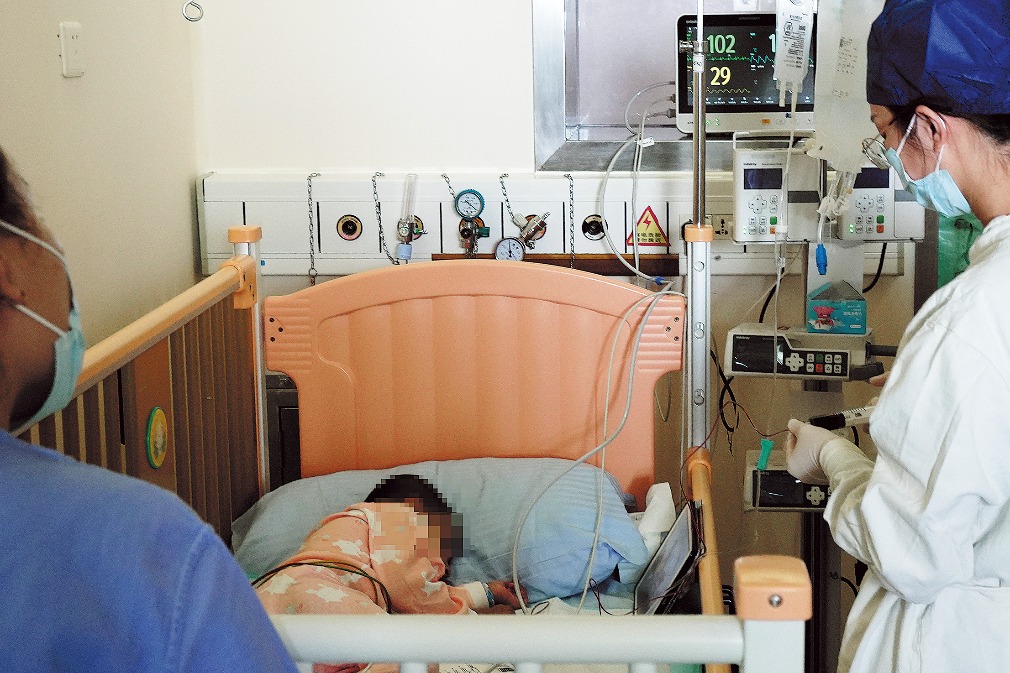Chinese parents find support in sharing Rett syndrome experiences

Tang Dafeng began livestreaming on Douyin, the Chinese version of TikTok, at 10 pm, saying hello to the audience and introducing the story of her 3-year-old daughter, who two years ago was diagnosed with Rett syndrome, a rare disease that many people have never heard of.
On Douyin, many mothers of daughters with Rett syndrome like Tang are sharing stories of their kids fighting the disease, and, as a result, more helping hands are being extended to families in need.
Rett syndrome is a rare genetic neurological and developmental disorder that affects the way the brain develops. It particularly affects speech, purposeful hand use, and coordination, leaving individuals understanding more than they can communicate.
Caused by a gene mutation, this disorder is first recognized in infancy and occurs primarily in girls. According to statistics, one in every 10,000 to 15,000 girls is born with this syndrome.
Austrian medic Andreas Rett originally described the syndrome in 1966. The first case in China was reported by Peking University First Hospital in 1988.
"My doctoral supervisor Wu Xiru was the first to diagnose this disease in China. In 1991, I became a clinical doctoral student under the guidance of Professor Wu and began to do research on Rett syndrome," says Bao Xinhua, an expert in pediatric neurology at Peking University First Hospital.
Bao says that, on average, she diagnoses about five Rett syndrome cases monthly. "These children had usually been diagnosed with brain dysplasia and autism before," says Bao.
Tang's daughter Zhizhi is one of Bao's patients.
At the beginning of 2021, after discovering that her daughter showed signs of autism, as well as degradation in hand function and language, Tang arranged all kinds of examinations at a hospital in Beijing, but the results showed that everything was fine with her daughter.
"In a WeChat group for parents of autistic children, a father suggested that Zhizhi might be a 'Rett child', and added that this meant she wouldn't live long. I was left trembling," Tang recalls.
On March 9, 2021, Tang came to Bao's clinic with 18-month-old Zhizhi, and reserved a genetic test for her. About a month later, Tang received the result of the report, which finally confirmed that Zhizhi had Rett syndrome.
After Zhizhi initially showed symptoms of Rett syndrome, Tang quit her job in Beijing and the whole family moved to Cangzhou, a city in North China's Hebei province, also the hometown of Tang's husband.
Tang says it was hard for her to make the transition from office worker to a stay-at-home mother, let alone the mother of a child with special needs.
In May 2021, Tang established an account on Xiaohongshu, China's lifestyle-focused social media platform, to share her knowledge about Rett syndrome and details of her daughter's daily rehabilitation training. She has also been constantly answering questions for those parents who suspect their kids might have such a syndrome, and she readily accepts interview requests either from media organizations or college researchers.
Wang Nan is mother to 4-year-old twins, both of whom were diagnosed with Rett syndrome when they were 15 months old. Like Zhizhi, they are also receiving rehabilitation training.
"Now, the rehabilitation cost of two children is 80,000 to 100,000 yuan ($11,500-14,400) a year," says Wang, adding that, in China, there is no rehabilitation institution that is exclusively set up for children with Rett syndrome yet, and this means her twins are receiving treatment together with people diagnosed with autism.
Currently, there are no drugs on the market globally to treat Rett syndrome. However, families like the Tangs and the Wangs are not simply waiting. Instead, they persist in communicating on social media, sharing information about this rare syndrome with the public.
"I used to worry that people would discriminate against my children, but now I don't. I truly feel the value of my daughter as a child with a rare disease and our value as parents of a child like Zhizhi," says Tang. In her view, "it is most urgent for patients with Rett syndrome to be noticed and understood by the public."
Rare diseases can be hard to diagnose and treatment can be difficult, and this is a major public health problem commonly faced by people around the world. In recent years, China has increased investment in medicine and health.
There are now more than 4,800 prenatal screening institutions and some 500 prenatal diagnostic institutions nationwide. Authorities are also making efforts by cutting value-added tax on imports and domestic production of drugs to treat rare diseases and illnesses, and increasing the number of such treatments included in China's medical insurance catalog.
Thanks to a State bulk-procurement program, which started on Jan 1, 2022, the price of a single jab of Nusinersen, a medicine used to treat spinal muscular atrophy, a rare neuromuscular disorder, fell from 700,000 yuan to 33,000 yuan in China, while the national health insurance will cover many such expenses.
"This news has given us great confidence. Now, Zhizhi can also receive living and rehabilitation subsidies from the government. I have faith that we will overcome all the obstacles we face," Tang says.
?
Today's Top News
- Xi encourages Red Cross Society of China to enhance humanitarian services
- NDRC brings forward investment plans
- Iran warns Israel against attacks
- Premier's visit to boost synergy
- Opposing 'independence' right path for Taiwan residents
- Former top legislator Wu Bangguo dies at 84






























